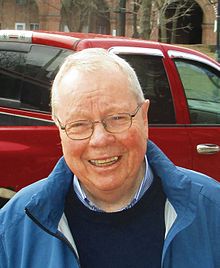David Crombie
|
The Honourable David Crombie PC OC OOnt |
|
|---|---|

David Crombie, 2016
|
|
| Secretary of State for Canada | |
|
In office June 30, 1986 – March 30, 1988 |
|
| Prime Minister | Brian Mulroney |
| Preceded by | Benoît Bouchard |
| Succeeded by | Lucien Bouchard |
| Minister of Indian Affairs and Northern Development | |
|
In office September 17, 1984 – June 29, 1986 |
|
| Prime Minister | Brian Mulroney |
| Preceded by | Doug Frith |
| Succeeded by | Bill McKnight |
| Minister of National Health and Welfare | |
|
In office June 4, 1979 – March 2, 1980 |
|
| Prime Minister | Joe Clark |
| Preceded by | Monique Bégin |
| Succeeded by | Monique Bégin |
| Member of the Canadian Parliament for Rosedale |
|
|
In office 1978–1988 |
|
| Preceded by | Donald Stovel Macdonald |
| Succeeded by | David MacDonald |
| 56th Mayor of Toronto | |
|
In office December 1, 1972 – November 30, 1978 |
|
| Preceded by | William Dennison |
| Succeeded by | Fred Beavis, acting |
| Personal details | |
| Born |
April 24, 1936 Swansea, Ontario |
| Nationality | Canadian |
| Political party | Progressive Conservative |
| Spouse(s) | Shirley Crombie |
| Children | Jonathan, Robin, Carrie |
| Occupation | Professor |
David Edward Crombie PC OC OOnt (born April 24, 1936) is a Canadian politician, professor and consultant. Crombie served as mayor of Toronto from 1972 to 1978. In federal politics, he served as a Progressive Conservative Member of Parliament from 1978 to 1988 serving in several cabinet positions.
Crombie was a lecturer in politics and urban affairs at Ryerson in the 1960s when he became involved in Toronto's urban reform movement. At the time, the city had a very pro-development city council that allowed a great deal of demolition of older buildings, including houses, to make way for the construction of apartment blocks, office towers, and highways (see Spadina Expressway). Crombie, along with John Sewell and other urban reformers, became a leader in a grassroots movement that favoured curtailing development in favour of improving social services and prioritizing community interests.
Crombie was elected to Toronto's city council in 1970, and became Mayor of Toronto in 1972, ushering in an era of socially responsible urban development inspired by thinkers such as Jane Jacobs. Crombie was the first mayor who represented the reform movement of Toronto politics, and his policies differed sharply from those of the Old Guard who preceded him.
Much of Crombie's time as mayor was spent trying to rein in the development industry. He initially imposed a 45-foot limit on all new constructions, but this was overturned by the Ontario Municipal Board. Crombie then put forward a new official plan that imposed varying height restrictions across the city, and this was upheld by the board.
The Spadina Expressway had been halted by premier Bill Davis in 1971, but Davis continued to support the construction of the Allen Expressway in the north. Crombie attempted but failed to have it halted. He was more successful in countering plans for the Scarborough Expressway; all work was halted during Crombie's term, leading to its eventual cancellation.
...
Wikipedia
